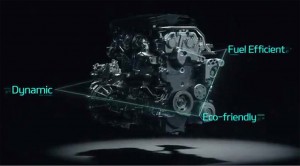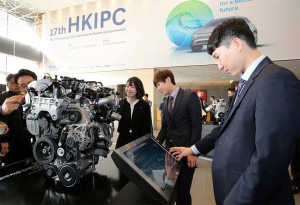Under pressure to boost mileage and reduce emissions, Hyundai Motor Group has unveiled a new powertrain family, dubbed Smart Stream, that eventually will be used in all of the carmaker’s vehicles – which means those sold through the Hyundai, Kia and Genesis brands.
The Smart Stream engines will be available in both gasoline and diesel configurations and will be part of a broader powertrain push by the Korean carmaker that also will include new plug-in hybrids and pure battery-electric drivelines. Hyundai also showed off its next-generation fuel-cell technology at the International Powertrain Conference that opened in Seoul, South Korea, on Tuesday.
Eventually, the Smart Stream family will consist of 10 different gasoline engines, as well as six diesels and six transmissions. But the roll-out won’t be completed until 2022, the company said during the conference, which has attracted about 1,200 engineers and academics from around the world.
Some observers are likening Hyundai’s Smart Stream to the Mazda SkyActiv technology and Honda’s Earth Dreams powertrains. The goal is to downsize while actually boosting both performance and fuel economy. Hyundai will be using a number of promising new technologies to achieve those traditionally incompatible goals – as well as reducing emissions.
(Hyundai, Biscotto team up for HyperEconiq. For more, Click Here.)

The Smart Stream engine family features powerplants that outperform their less advanced counterparts.
First out of the box is the 1.6-liter T-GDi Smart Stream inline-four. Along with direct injection and turbocharging, it will introduce:
- Continuously Variable Valve Duration, or CVVD. Which constantly adjusts the amount of time the engine’s valves remain open;
- High Ignition Energy Exhaust Recirculation, a way to improve current exhaust gas recirculation, or EGR, systems to increase the compression ratio without creating engine knock;
- Other technologies will include ways to better control engine temperatures and reduce engine friction.
All told, Hyundai hopes to improve the thermal efficiency of its engines by as much as 50% in the coming years. That would mean a Smart Stream engine with the efficiency of a diesel, while the new diesels would give today’s conventional hybrids a run for the money.
(Click Here for details about Hyundai’s plans to expand its eco-friendly vehicle line-up.)
The 1.6-liter engine, the first to use Smart Stream technologies, will be paired with a wet-clutch eight-speed DCT gearbox that is expected to be both more efficient and smoother than Hyundai’s current seven-speed DCT.
Hyundai gave a first look at the Smart Stream technology during the Frankfurt Motor Show last month, but offered more details about its plans during the international powertrain conference in Seoul.
The automaker noted in a media news release that it believes, “that the internal combustion engine will maintain a strong presence in the market until 2025, as plug-in hybrid and electric powertrains start to receive wider acceptance.”
Like rivals Toyota and Honda, however, Hyundai is hedging its bets on powertrain technologies and is also continuing to develop hydrogen fuel-cell alternatives. A replacement for the current Tucson FCV is to reach market before decades end, with other models in the works.
(Hyundai gives buyers assurance with new car sales process. For the story, Click Here.)
As for actual roll-out plans for Smart Stream, Hyundai and Kia have yet to reveal which models will get the new powertrain technology first.

